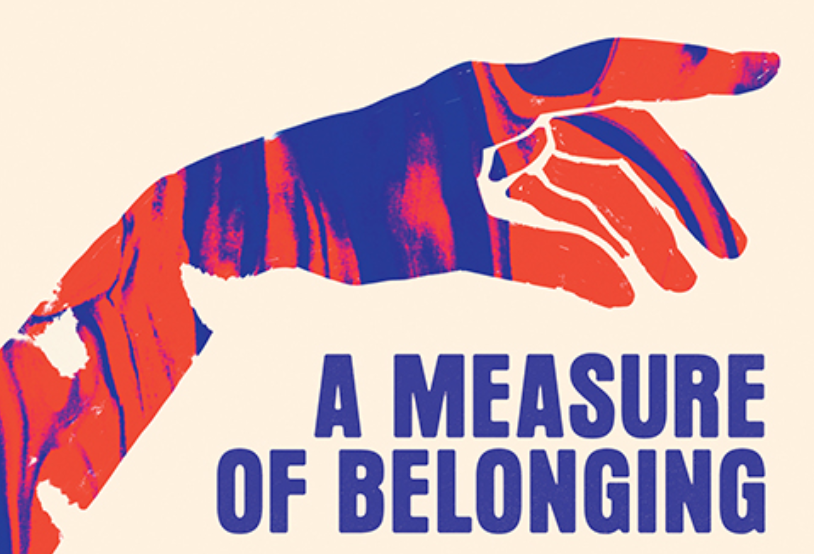Writers of color consider what it means to belong in the South
By Kashif Andrew Graham for Chapter16.org
A Measure of Belonging: Twenty-One Writers of Color on the New American South considers the varying societal access points for people of color below the Mason-Dixon line. From a broad range of perspectives, the book takes on an essential question: What does it mean to “get into” the modern South, rather than remaining an eternal tourist?
This diverse collection of essays, edited by Cinelle Barnes, reveals that sometimes the answer is welcoming yourself — as Osayi Endolyn explains in “A New Normal South.” Her “Brown in the South” dinners in Decatur, Georgia, feature chefs of Indian background who work in the modern South. She describes the gatherings as “the version of the South that I’ve wanted to be a part of since settling here.” The menu? Southern-Indian fusions like deep-fried fish puppies and spiced fried chicken on uttapam. Because food is home.

And food guides several of the essayists in their homemaking. In “Duos,” Devi Laskar describes her North Carolina childhood home as West Bengal in the South, filled with the aroma of buffalo carp and ground spices. Regina Bradley knows that she is unfortunately “Outta the Souf” when Waffle House signs are no longer black and yellow and Popeyes is non-existent. Jennifer Hope Choi’s Korean mother, despite endless relocations, seems right at home as long as she can eat kimchi and rice.
The essayists also explore the meaning of “belonging” in Southern academia. When Aruni Kashyap tells potential landlords that he is a professor of English literature at the University of Georgia, they ask him if he means ESL. In Christena Cleveland’s “White Devil in Blue: Duke Basketball, Religion, and Modern Day Slavery in the ‘New’ South,” Cleveland describes her awakening to the profound inequality baked into “the racial and religious power dynamics” of NCAA basketball at Duke University. As she expresses her concerns about institutional racism, she is informed that she might not be cut out for Duke. The title of the essay suggests that perhaps the “new” South is not new at all; maybe it is only the old South, with new appliances retrofitted. Gary Jackson, a professor at the College of Charleston, knows the value of “behaving” in order to survive in academia but is still called angry and dark by a student.
As this is a book about people of color, skin color does not go unexamined. In “Foreign and Domestic: On Color, Comfort, and Crime in Miami,” South Asian Jaswinder Bolina considers that he could easily be mistaken for his Latino muggers in Coral Gables — they’re the same color. In the same neighborhood, Filipina M. Evelina Galang is mistaken for Chinese Jamaican. Ivelisse Rodriguez, in “White, Other, and Black,” wrestles with whether she is more white or Black when there is no other option at the DMV. She is not content to “pass,” a phenomenon that Toni Jensen also explores as a Métis woman.

A Measure of Belonging: Twenty-One Writers of Color on the New American South
Edited by Cinelle Barnes
Hub City Press
192 pages
$16.95
Cinelle Barnes, Jennifer Hope Choi, and Minda Honey will discuss A Measure of Belonging at the 2020 Southern Festival of Books, held online October 1-11.
These essays, all well written, possess a great variety of tones and approaches. Nichole Perkins’ “Southern, Not a Belle” takes on a humorous flair to describe the challenge of transcending stereotypes in dating. Joy Priest’s essay reads as a memoir/rap opera hybrid, each memory-aria delineated by the titles of classic hip-hop songs. In “That’s Not Actually True” Kiese Laymon’s interjections of the title phrase create a double consciousness that is psychedelic, yet truthful. Tiana Clark’s contribution takes letter form, as an epistle to the South. “Dear Tennessee,” she writes, “I thought I hated you — I didn’t love you until I left you.”
From the entire work, we experience the South not as mere backdrop but as a determinate character, although it sometimes shifts in appearance. Segregated ‘Miam-ah’ becomes Miami. The Tennessee that one has escaped from becomes the pain that one will endure just to be home. The North Carolina red clay that one has long pretended not to know becomes, in reverie, a last surviving relative.
A Measure of Belonging is a critical work, particularly during our country’s current great migration southward. Black Millennials are returning to the South to purchase the homes and farmland on which their ancestors toiled. As remote work becomes increasingly common, more Americans are moving out of the big cities and toward the cost-friendly South. Still others have lived in the South for generations and have yet to feel an affirming welcome. Who gets to decide who is in and who is not?
This book, with its cast of brilliant writers, explores the multi-faceted and often porous Southern identity in contemporary times. For many people of color, the South is home, happiness, and hurt.

Kashif Andrew Graham is a writer and theological librarian. He enjoys writing poetry on his collection of vintage typewriters. He is currently at work on a novel about an interracial gay couple living in East Tennessee

